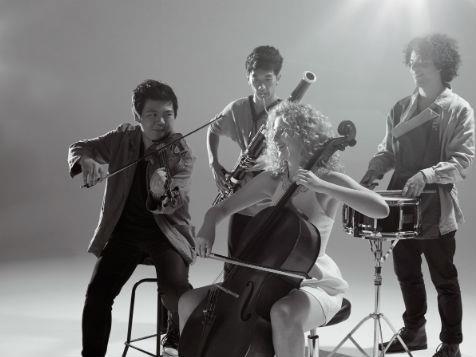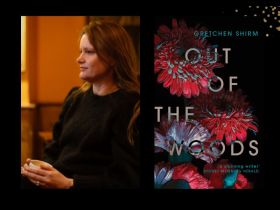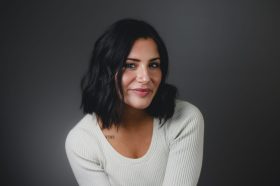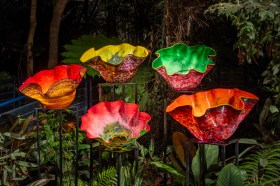Alexander Chiu, violin, Annabelle Oomens, cello, Gabriel Fischer, percussion, Justin Sun, bassoon. Image by Kris Washusen.
Throughout his time as CEO of the Australian Youth Orchestra (AYO), Colin Cornish has seen young orchestral musicians develop their performance skills and confidence through memorable performances.
‘My aim was always to ensure that the AYO was achieving great things on the stage and be acknowledged for these achievements,’ he said.
‘The most satisfying part of working in this role – and I can speak on behalf of the AYO staff – is that we get to experience the amazing change and development of these young people over a three year period.’
‘We see them transform and achieve things that they never thought they could do and discover things that they never knew existed. We hear their feedback and thoughts and see how they grow as musicians.’
It is with this spirit that AYO is now inviting applicants to submit for an audition to the 2015 intake, with an impressive range of formalised orchestral training programs on offer.
Cornish said that with every new intake, he gets to see a regeneration which fulfils the organisations vision to provide the very best orchestral music education in Australia and across the world.
The AYO is now recognised for some of the finest orchestral playing that audiences hear, some of the best learning and training opportunities that teachers and tutors, conductors and students can experience, and that reach is now even greater as the AYO expands into the virtual world.
In partnership with Principal Sponsor Accenture AYO has been able to transcend barriers of location with live web streamed auditions, master classes and performances.
‘We are enabling students and tutors from all around the country connect with the AYO and experience our unique training pathway.
Cornish said that AYO assessors make extra efforts to see as many potential applicants as possible, with opportunities to audition in rural and regional areas as well as major capital cities. It is a highly competitive process with the result being that the AYO secures the best of the best young classical musicians.
The process of submitting an AYO application is easy and can be completed online via the AYO website. Applicants will receive a detailed audition pack with all relevant information included to ensure optimal audition preparation.
During the audition itself a panel of assessors will test over 1300 applicants – for just 300 places – with orchestral excerpts, a solo performance and general discussion around the student’s future pathway.
The panel listens to the audition and then discusses the training pathway the musician forsees, as well as personal goals and aspirations. Offers to successful candidates will be made in October.’
Cornish said that AYO programs on a practical level are quite different to studying full time at a university or having traditional music lessons with a teacher at school.
‘Our programs are centred around meeting like-minded musicians, of a similar age from all around the country, and playing music together with fantastic tutors.’
‘This all happens in quite an intensive learning environment as courses are anywhere from one to four weeks. You are essentially immersed in music-making for twelve to fifteen hours a day,’ he said.
AYO programs are widely noted for their innovative approach, with everything from small group classes, orchestral groups, seminars, professional development such as audition preparation, career advice, health and wellbeing classes – all of which are geared to lead into a professional path.
‘Through our training pathway which you can enter from the age of 12, you will not only develop orchestral skills and expertise, but you will also develop a lot of personal and social skills.’
Cornish said he had also found a lot of satisfaction in the ongoing success of AYO programs. ‘I know many young people who have been involved with the AYO, who come in as one of a large group and finish a number of years with the confidence to stand up and lead the orchestra.’
‘Being in that environment, being around other like minded individuals also develops your confidence, your presentation and communication skills, and that’s what sets our programs apart,’ he said.
‘We aim to develop our musicians to the fullest in order to prepare them for a professional career.’
Applications to AYO open on the 26 May, with auditions scheduled for Australian regional and capital cities during August and September.
To be eligible to apply for AYO’s programs – Australian Youth Orchestra, AYO National Music Camp, AYO Young Symphonists, AYO Chamber Players, and AYO Orchestral Career Development programs- musicians must be between 12 and 30 years of age.
For more information visit the Australian Youth Orchestra website.





